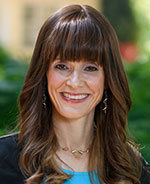
Dr. Yonina Eldar is a Professor in the Department of Mathematics and Computer Science, Weizmann Institute of Science, Rechovot, Israel. She was previously a Professor in the Department of Electrical Engineering at the Technion, where she held the Edwards Chair in Engineering.
She is also a Visiting Professor at MIT, a Visiting Scientist at the Broad Institute, and an Adjunct Professor at Duke University and was a Visiting Professor at Stanford. She received the B.Sc. degree in physics and the B.Sc. degree in electrical engineering both from Tel-Aviv University (TAU), Tel-Aviv, Israel, in 1995 and 1996, respectively, and the Ph.D. degree in electrical engineering and computer science from the Massachusetts Institute of Technology (MIT), Cambridge, in 2002. She is a member of the Israel Academy of Sciences and Humanities, an IEEE Fellow and a EURASIP Fellow.
She has received many awards for excellence in research and teaching, including the IEEE Signal Processing Society Technical Achievement Award (2013), the IEEE/AESS Fred Nathanson Memorial Radar Award (2014) and the IEEE Kiyo Tomiyasu Award (2016). She was a Horev Fellow of the Leaders in Science and Technology program at the Technion and an Alon Fellow. She received the Michael Bruno Memorial Award from the Rothschild Foundation, the Weizmann Prize for Exact Sciences, the Wolf Foundation Krill Prize for Excellence in Scientific Research, the Henry Taub Prize for Excellence in Research (twice), the Hershel Rich Innovation Award (three times), the Award for Women with Distinguished Contributions, the Andre and Bella Meyer Lectureship, the Career Development Chair at the Technion, the Muriel & David Jacknow Award for Excellence in Teaching, and the Technion’s Award for Excellence in Teaching (two times).
She received several best paper awards and best demo awards together with her research students and colleagues, was selected as one of the 50 most influential women in Israel, and was a member of the Israel Committee for Higher Education. She is the Editor in Chief of Foundations and Trends in Signal Processing and a member of several IEEE Technical Committees and Award Committees.
We approached her with a few questions.
Q. Why did you become a Professor at the Weizmann Institute of Science?
I always enjoyed maths and physics in school and knew I wanted to work in a field that combined them. It was important to me to do work that has an impact on society and involves working with people. I was very fortunate to grow up in a home where knowledge was always highly regarded. My parents are both educators and are extremely devoted and passionate about teaching, reading, and learning. Although they are not scientists, they installed in me and my siblings the desire to learn, to teach, and to make an impact. During my undergraduate studies, I was fortunate to be able to learn from two mentors, Professors Arie Yeredor and Udi Weinstein, who exposed me to the beauty and unlimited opportunities of signal processing and scientific research. I completed my Ph.D. at MIT, where I worked with Professor Al Oppenheim, who leads a remarkable and unique signal processing group. When I finished, I knew that my passion is in research, development, and working with young talented students.
Q. How does your work affect society?
In Academia, we have the privilege to choose the research projects we want to work on and can, therefore, choose research and educational activities that we believe will benefit society. First, and foremost, educating the next generation of passionate engineers and researchers who will use their talents to further promote society both on the research level and on the educational level. An important part of that is making our research environment diverse and inclusive and educating our students to not only consider their own research but to be mindful of where they can contribute to society more largely. Second, on the scientific level, the research in our lab focuses on low-rate signal sampling and information extraction by combining theoretical and practical research in order to pave the way to new technologies in diverse areas such as medical imaging, communication, radar, optics, quantum systems, and biological inference. We focus on both developing theory and facilitating the transition from purely theoretical research to the development, design, and implementation of prototype systems and clinical studies. For example, making technologies more efficient and accessible, overcoming fundamental physical limits that can enable new scientific discoveries, and providing improved imaging for medical diagnostics. My aspiration is to build a truly interdisciplinary lab that uses signal processing to develop new devices and algorithms that will enable discoveries in biology and physics and impact the clinical world.
Q. What challenges you had to face to get where you are today?
Research is a roller coaster – we do not always succeed in solving the problems we set out to solve. It is extremely important to have patience and be persistent. Being a female scientist in Israel adds further to the challenge: We have far fewer research students and postdocs here than in other research centers and the number of PIs is also limited. At the Electrical Engineering Department at the Technion, where I spent most of my career to date, I was the first female full professor which had a lot of difficulties associated with it including implicit and explicit biases. I am a proud mother of five children; raising a family while pursuing an academic career is not always easy. Besides objective challenges, there are difficulties that result from an intense environment that does not always accept different work styles and priorities. I am very fortunate to have a strong support system at home and extremely supportive colleagues who have also become close friends who helped me overcome many of these challenges. It is extremely important to have mentors in the workplace. Recently, together with other friends and colleagues, I have tried to be active in creating such groups for women scientists at all career stages.
In Israel, I head the national committee of higher education for gender fairness. Providing opportunities for women scientists, such as invitations to give talks and nominating deserving women for awards, is an important way to try to overcome the inherent implicit bias. Unfortunately, some engineering associations do not have a very good track record in recognizing deserving women members. A recent survey by the IEEE reported that over 70% of women experienced negative outcomes in their careers due to gender. As a community, we need to find ways to change this, by mentoring, supporting each other, actively promoting women scientists and ensuring that deserving women are properly rewarded. It is also important to ensure that anyone who experiences difficulties and biases has a place to turn to.
Q. What advice would you give to scientists/engineers in signal processing?
Signal processing is an amazing field: it is the science behind our digital lives, enhancing our ability to communicate and share information. As signal processing researchers and practitioners we have the ability to impact technology and society in many different areas. When you choose a problem to work on or a company to work at, follow your passion! Choose an environment where you feel you can truly contribute and have an impact and that you will have the ability to learn and to grow. Stay curious, go to conferences and talks, and keep up to date on the rapid progress in this field. Look for opportunities to apply your knowledge to other areas and fields – one of the joys of working in this area is seeing how many problems you can help solve with signal processing tools out of the traditional areas of signal processing. Always try to understand the core of what you are doing, don’t only be focused on results. Spend time explaining what you are working on to other colleagues--this will help you understand your own problems better. Leave yourself time to think and reflect, to allow for out-of-the-box ideas.
To female scientists, I would add that they should know they have a unique and important role in science. In general, women tend to be more interdisciplinary and broader in their thinking. They are often motivated to interact more with colleagues and students, facilitating collaborative and interdisciplinary research. They are often attracted to topics that have a direct impact on society and motivated to connect technology to society. Define your goals and make choices that are right for you--there are many ways to succeed. Believe in yourself and in your own way.
Q. Anything else that you would like to add?
Always be curious, pave your own way, and don’t feel compelled to follow other people’s paths. If something interests you – go after it! Do not be discouraged by failure, never give up, learn from every experience good or bad, enjoy your work, and always remember the reason you are doing what you are doing. Be persistent, define your goals clearly, and achieve them, even if it takes time. Find mentors that can support you in and out of the office, and build a supportive environment. Value collaborations, and learn from the different ways people approach problems. To female scientists, I would add bring your unique talents and style to your workplace – and celebrate them!



